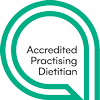Challenge your inner food critic
This is the fourth post in a 10-part series looking at the principles of Intuitive Eating. The previous post in this series was on making peace with food.
Do you feel guilty after eating a piece of cake, some chocolate, ice cream, chips, pizza or French fries?
If you do, it’s not surprising. We live in a culture that encourages, normalises and reinforces judgemental diet culture thinking like:
- What, when and how we “should” or “shouldn’t” be eating.
- What a “good” and “bad” food choice or way of eating is (if you read my last blog, making peace with food, you will remember food does not have any moral value).
- How what you eat is the primary determinant of your health (the truth is there are a great many determinants of health, food is just one. And, not all factors that contribute to health are within our personal control including the social determinants of health like the conditions in which we live, work and play and access to healthcare).
We are not born feeling guilty after eating (specific foods). We only have to watch a young child enjoy an ice cream and then go on playing without a care in the world to know this is true. Feeling guilty after eating certain foods is the product of:
- Food beliefs shared by the media (especially women’s magazines).
- Food beliefs shared on social media (especially by influencers, but, also increasingly, by well-meaning health professionals).
- Diet industry marketing.
- “Advice” from friends & family.
(Usually well-intentioned) advice from health professionals.
Diet culture thinking makes a peaceful relationship with food impossible
Diet culture thinking often starts with wanting to genuinely improve our health and there is nothing wrong with wanting that. The problem is that, over time, we unconsciously internalise food beliefs as food rules. And food rules quickly become the basis for judging our own (and other people’s) food choices and the reason why we feel guilty after “breaking” them. Having food rules about how you should and shouldn’t eat does not allow you to have a peaceful relationship with food. Rather it means any time you eat, you’re likely to judge yourself as being either “good” or “bad” on the basis of your food rules. For example, if you choose a salad for lunch, you’ve been “good”. Have a pizza and you’ve been “bad”.
Your inner food critic
You can think of the voice that shares your food rules and beliefs and insists you adhere to them as your inner food critic (or the “food police”, as it’s known in Intuitive Eating). Your inner food critic uses your food rules and beliefs to judge your food choices and eating behaviour. Here are a few common food rules and beliefs your critical inner voice might use to judge your food choices:
- Not eating anything after 6 p.m.
- Not eating before a set time like midday.
- Only snacking on fruit and vegetables.
- Avoiding dairy foods (for reasons other than e.g. lactose intolerance).
- Avoiding or limiting carbs.
- Avoiding “processed” foods.
- Only eating “clean” foods.
Moralising foods as “good”, “bad”, “healthy”, “unhealthy”, “clean” etc based on food rules and beliefs is what fuels the guilt and shame many people experience after eating a “forbidden” food. And experiencing negative feelings like these can affect our eating behaviour. In short, when you are constantly policing what, when and how much you eat, there can be no food peace. This is why the fourth principle of Intuitive Eating “Challenge the food police” is all about:
- Recognising, challenging and dismantling food rules and, beliefs and thoughts.
- Recognising and challenging your inner food critic.
What does your inner food critic sound like?
In order to start challenging your inner food critic, it’s helpful to have a sense of how it sounds. Even if you’re not dieting, your inner food critic can still be present. It likes to second guess and question your body’s internal cues like hunger and your food preferences. Here are a few ways it can sound:
- That has too many calories!
- You shouldn’t eat after 6pm.
- That’s too high in carbs/sugar/fats etc.
- You’ll gain weight if you eat that.
- You ate too much at lunchtime, no dinner for you!
- You have to “work off” that cupcake.
- It’s not time to eat yet.
- You just ate, how can you still be hungry?
Challenging your inner food critic
Challenging your inner food critic allows you to:
- Learn to trust your body.
- Develop body respect.
- Make food choices based on satisfaction and your body’s internal cues (hunger, fullness) as well as your emotional needs.
- Tune out the external diet culture noise and tune into your body’s internal cues (hunger, fullness) as well as your emotional needs.
It involves first identifying and challenging your food rules and beliefs and then identifying, challenging and replacing unhelpful thoughts with more compassionate ones. Here are 5 steps to get you started.
Step 1: Identify your food rules and beliefs
Listen for your inner food critic and jot down the food thoughts that pop into your head before you start eating. Listen for words like “must”, “mustn’t”, “should”, “shouldn’t”, “good” and “bad”. For example, “I shouldn’t eat after 6 pm”.
Choose one of your rules and make a plan to get rid of it. Ask yourself: what first small step you can take to stop living by that rule? For example, if you typically follow the no food after 6 pm rule, you could try allowing yourself a snack when you’re hungry before bedtime. Try this and notice without judgement how you feel. Remember, it’s normal to feel afraid or uncomfortable about breaking a long-held food rule. Then get curious about this food rule (see step 2) and try challenging that food rule with facts and considering the impact that food rule has had (see step 3). Be patient and gentle with yourself while you work your way down your list of food rules.
Step 2: Get curious about your food rules and beliefs
Once you’ve started noticing your food rules and beliefs, try asking yourself these questions:
- Where did these food rules come from?
- How do I feel when I “break” these food rules?
- How does “breaking” them affect my subsequent eating behaviour?
For example, does eating one cookie lead to thinking you’ve “blown it” and to eating the whole packet?
Step 3: Challenge your food rules and beliefs
Often, food rules and beliefs are based on pseudoscience, not actual science. Ask yourself whether your food belief or rule is supported by science. For example: You read somewhere that a certain food can give you cancer. Can it really? Remember the media loves a headline! And even if you find some research to back up a food rule or belief, follow up with these questions:
- How helpful have my food rules been?
- What impact have they had on my life, my body, my relationships?
- How do they make me feel? Behave?
- Is that really how I want to feel for the rest of my life?
By becoming aware of and curious about your food rules and beliefs and challenging them, you loosen your connection to them. And when you are less connected to the rules, you are more able to shift your connection internally, to what you and your body actually need.
Step 4: Identify negative talk about food without judgement
We have thousands of thoughts a day. Some are true, some are not. Some thoughts are helpful and some are not. Being aware of negative, unhelpful thoughts about food is the first step towards changing them into more neutral, realistic and compassionate ones.
Here are 5 common types of negative thinking. How many do you recognise in yourself?
Black and white thinking
Dichotomous or black and white thinking is based on the premise of achieving perfection. For example, you have a rule not to eat cookies. Here’s what black and white thinking might look like: “I can’t eat this cookie! Oh well, maybe just one. Now I blew it! I may as well eat them all and start my diet again tomorrow”. Allowing more flexibility in your eating behaviours will slowly erode this perfectionist (and unhelpful) tendency.
Labelling
You give yourself harsh, critical names, call yourself a “bad” or “stupid” person. For example, you might say to yourself: “I’m disgusting because I can’t stop eating cookies”.
“Should” and “must” statements
You feel guilty if you are unable to stick to your food rules. Because the goals you set yourself are unattainable, having them eventually leads to feelings of anxiety, low self-esteem and low mood. One example might be: “I must stop eating all my meals by 6pm”.
Compare and despair
You compare yourself to others and find positive things about them but focus on things you don’t like about yourself. You might compare your food choices to those of someone else. For example, you might think: “They have so much willpower around food whereas I am totally out of control around food and will never feel comfortable around it”.
Mental filter
You tend to filter out things that are positive and only focus on the negatives. For example, you might say: “I can’t enjoy this cookie because it’s full of fat and sugar”
Step 5: Replace negative self-talk with nurturing, compassionate words
Once you’ve identified your negative thoughts around food, you can start replacing the negative self-talk with nurturing, more compassionate words. One way to start doing this is to try using permissive words like “can”, “may” and “is OK”. For example, you could replace the negative thought “I shouldn’t eat after 6pm” with “I can eat whenever I am hungry. Hunger is my body’s way of telling me I need to eat”.
You could also start replacing black-and-white thinking with moderate thoughts. For example: you could replace the negative thought “my whole day is spoiled because I’ve eaten a cookie” with “My day is not spoiled just because I ate a cookie. That one cookie does not negate all the other things I do to take care of myself. Actually, it’s really great that I’m allowing myself to eat a cookie! And it was delicious!”.
Challenging your inner food critic is not easy. And it is not something you can change overnight. Keep in mind you are unpacking years of dieting and that each small step is a success worth celebrating. Patience, curiosity and self-compassion are key.
Short and sweet
Having food rules and unrealistic expectations of how you should and shouldn’t eat does not allow you to have a peaceful relationship with food. Recognising, challenging and dismantling food rules, beliefs and replacing unhelpful thoughts with nurturing, compassionate words allows you to finally make peace with food.
Ready to take the next step? Contact me and request a complimentary call to find out more about Intuitive Eating and how it can help you truly nourish yourself – body, mind and soul.






